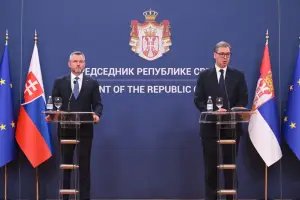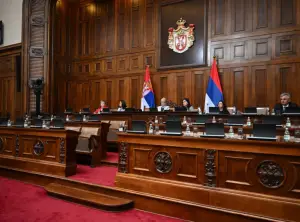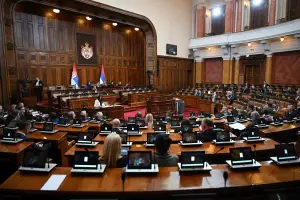- Serbia
Get to know Serbia
- Citizens
Culture and science
Health services
Pension and disability insurance
- Business
Employment
Economy
- Media
- Government
- Contact
Keep in touch
Contact form
Back
Keepin touch
Whether you have a question, comment, suggestion or any problem in the purview of the government, send us your message and we will try to respond as soon as possible. If your problem is not in our purview, we will forward your message to the relevant institution.
Q:
A:
Serbia-Montenegro receives positive assessment of feasibility study
Belgrade,
12 April 2005
EU Enlargement Commissioner Olli Rehn has told a press conference in Strasbourg that the state union of Serbia-Montenegro received a positive assessment of the country’s feasibility study for concluding the stabilisation and association agreement with the EU.
Rehn said that Serbia-Montenegro has progressed in the processes of reform, adding that reforms are fragile but noticeable. He stressed that the state union must continue its cooperation with the International Criminal Tribunal for former Yugoslavia (ICTY) in The Hague.
Rehn said that the positive assessment of the feasibility study is the first agreement between Serbia-Montenegro and the EU. He announced that as soon as the state union goes on with reforms, new steps in the EU accession phase will be taken.
According to Rehn, the most important reforms, and thus for Serbia-Montenegro’s admission in the EU, include the continuation of reforms in the legal system, public administration and the country’s economy. Also, the Constitutional Charter of Serbia-Montenegro must be respected, as well as the rule of law.
Rehn stressed that the EU will offer the state union political and technical assistance in reforming the judiciary system and public administration, as well as financial aid in order to help build institutions and administrative capacities in the state and local administration.
The feasibility study is a special report with which the European Commission informs the EU Council of Ministers that a country is prepared to enter certain institutional relations with the EU. The document is prepared by the European Commission delegation to Belgrade, in cooperation with the Working Group from Brussels. The most important part of the study is the assessment whether a country is prepared to sign the association and stabilisation agreement within a certain period of time and become a full member of the EU.
The study contains assessments of whether Serbia's judiciary is harmonised with that of the EU in some respects. The countries for which such studies are elaborated must meet some political criteria, including the establishment of democratic institutions and the rule of law, the respect for human rights, protection of minorities, regional cooperation and the fulfilment of international obligations, which in the case of Serbia entails full cooperation with the ICTY.
The positive assessment of the feasibility study is submitted to the EU Council of Ministers for adoption. After that, the European Commission begins official negotiations on the stabilisation and association agreement. After the negotiating country has reached an agreement in principle with the European Commission, the implementation of parts of the stabilisation and association agreement begins and the agreement is then ratified by all EU member states.
The feasibility study is a special report with which the European Commission informs the EU Council of Ministers that a country is prepared to enter certain institutional relations with the EU. The document is prepared by the European Commission delegation to Belgrade, in cooperation with the Working Group from Brussels. The most important part of the study is the assessment whether a country is prepared to sign the association and stabilisation agreement within a certain period of time and become a full member of the EU.
The study contains assessments of whether Serbia's judiciary is harmonised with that of the EU in some respects. The countries for which such studies are elaborated must meet some political criteria, including the establishment of democratic institutions and the rule of law, the respect for human rights, protection of minorities, regional cooperation and the fulfilment of international obligations, which in the case of Serbia entails full cooperation with the ICTY.
The positive assessment of the feasibility study is submitted to the EU Council of Ministers for adoption. After that, the European Commission begins official negotiations on the stabilisation and association agreement. After the negotiating country has reached an agreement in principle with the European Commission, the implementation of parts of the stabilisation and association agreement begins and the agreement is then ratified by all EU member states.
-
 Belgrade, 4 January 2026
Belgrade, 4 January 2026Violation of UN Charter has become dominant principle of contemporary politics
-
 Belgrade, 21 December 2025
Belgrade, 21 December 2025Strengthening cooperation with Slovakia in many areas
-
 Belgrade, 21 December 2025
Belgrade, 21 December 2025President of Slovakia ceremonially welcomed in front of Palace of Serbia
-
 Belgrade, 18 December 2025
Belgrade, 18 December 2025Vučić welcomes President of Georgia in front of Palace of Serbia
-
 Belgrade, 15 December 2025
Belgrade, 15 December 2025Serbia needs strong, stable education system
-
 Belgrade, 3 December 2025
Belgrade, 3 December 2025Parliament adopts 2026 budget
-
 Belgrade, 28 November 2025
Belgrade, 28 November 2025Serbian President welcomes President of DR Congo
-
 Belgrade, 7 November 2025
Belgrade, 7 November 2025Parliament adopts multiple laws
-
 Belgrade, 22 October 2025
Belgrade, 22 October 2025Parliament adopts several laws, ratifies multiple international agreements
-
 Belgrade, 15 October 2025
Belgrade, 15 October 2025Vučić welcomes Ursula von der Leyen in front of Palace of Serbia


